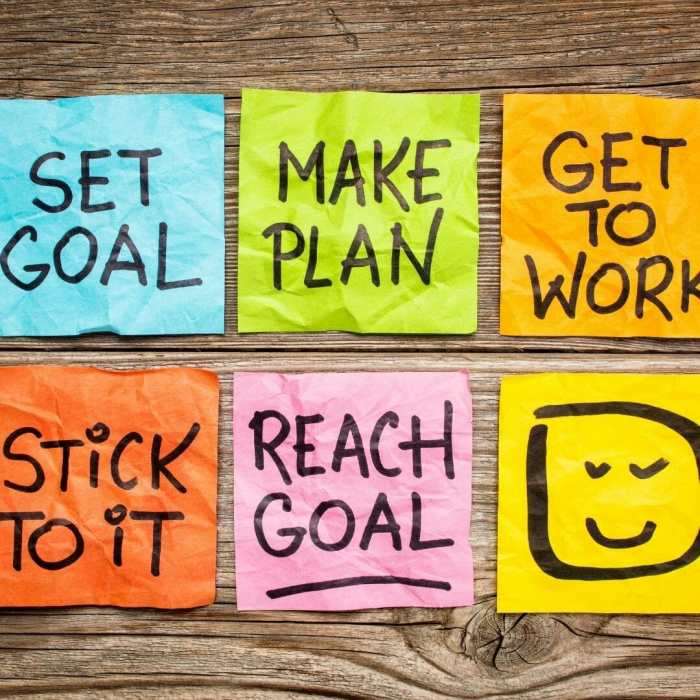Kicking off with Health and Fitness Goals, this opening paragraph is designed to captivate and engage the readers, setting the tone american high school hip style that unfolds with each word. Setting health and fitness goals is not just about physical appearance, but it’s also about overall well-being. It’s all about pushing yourself to be the best version of you, inside and out. Ready to dive into the world of health and fitness goals? Let’s do this!
From weight loss to muscle gain, endurance, and flexibility, there are so many areas to focus on. But it’s not just about the end goal, it’s about the journey and the positive changes you make along the way. So grab your water bottle, lace up those sneakers, and let’s get moving towards a healthier, happier you.
Importance of Health and Fitness Goals
Setting health and fitness goals is crucial for overall well-being as it provides a clear roadmap for individuals to follow in order to improve their physical and mental health. By having specific goals in mind, individuals are more likely to stay motivated and committed to making positive lifestyle changes that can lead to long-term benefits.
Increased Motivation
- Having clear health and fitness goals can boost motivation by providing a sense of purpose and direction.
- Goals act as a source of inspiration, pushing individuals to stay on track and work towards achieving their desired outcomes.
- When progress is made towards these goals, individuals experience a sense of accomplishment, further fueling their motivation to continue their health and fitness journey.
Impact on Mental Health and Self-Esteem
- Setting health and fitness goals can have a positive impact on mental health by reducing stress and anxiety levels.
- Accomplishing these goals can boost self-esteem and self-confidence, leading to an overall improvement in mental well-being.
- Having a clear focus on health and fitness goals can also help individuals develop a more positive body image and improve their overall quality of life.
Types of Health and Fitness Goals

Setting health and fitness goals is crucial for achieving overall wellness. There are various types of goals that individuals can strive for to improve their physical and mental well-being.
Weight Loss
Weight loss goals focus on reducing body weight to reach a healthier BMI. These goals often involve a combination of dietary changes, exercise routines, and lifestyle modifications to achieve sustainable results.
Muscle Gain
Muscle gain goals aim to increase muscle mass and strength through resistance training and proper nutrition. These goals typically involve progressive overload and adequate protein intake to promote muscle growth.
Endurance
Endurance goals revolve around improving cardiovascular fitness and stamina. Individuals may set goals to run longer distances, increase their cycling speed, or improve their overall endurance through consistent aerobic exercise.
Flexibility
Flexibility goals focus on enhancing range of motion and joint mobility. Stretching exercises, yoga, and Pilates are commonly used to improve flexibility and reduce the risk of injuries.
Short-term vs. Long-term Goals
Short-term health and fitness goals are typically achievable within a few weeks to a few months. These goals help individuals stay motivated and track their progress regularly. On the other hand, long-term goals are usually set for six months or more and require consistent effort and dedication to achieve significant results.
Significance of SMART Goals
Setting SMART goals is essential for success in health and fitness endeavors. These goals are Specific, Measurable, Achievable, Relevant, and Time-bound, providing a clear roadmap for individuals to follow. By setting SMART goals, individuals can stay focused, track their progress, and adjust their strategies as needed to achieve their desired outcomes.
Strategies for Achieving Health and Fitness Goals

To achieve health and fitness goals, it is essential to create a realistic action plan that includes specific strategies. Consistency and adaptability are key to maintaining motivation and making progress towards your goals.
Meal Planning
Meal planning is a crucial strategy in achieving health and fitness goals. By preparing nutritious meals in advance, you can ensure that you are fueling your body with the right nutrients and avoiding unhealthy food choices. This helps in controlling portion sizes and calorie intake, leading to better overall health.
Regular Exercise Routines, Health and Fitness Goals
Incorporating regular exercise routines into your daily schedule is another effective strategy for reaching health and fitness goals. Whether it’s going for a run, hitting the gym, or practicing yoga, consistent physical activity helps in improving cardiovascular health, building strength, and managing weight.
Tracking Progress
Tracking your progress is essential to stay motivated and monitor the results of your efforts. This can be done by keeping a fitness journal, using fitness apps, or measuring key metrics such as weight, body measurements, and workout performance. By tracking progress, you can make adjustments to your plan as needed and celebrate your achievements along the way.
Consistency and Adaptation
Consistency is key in achieving health and fitness goals. It’s important to stick to your action plan and make healthy choices consistently to see results. However, it’s also crucial to adapt your goals and strategies as needed. Listen to your body, make adjustments based on feedback, and set new goals to continue progressing on your health and fitness journey.
Monitoring Progress and Adjusting Goals: Health And Fitness Goals
Tracking progress towards health and fitness goals is crucial for success. It allows individuals to see how far they have come and what adjustments may be needed to continue moving forward.
Measuring Success and Making Adjustments
When measuring success, it’s important to use both quantitative and qualitative methods. Quantitative measures include tracking weight, body measurements, and workout performance. Qualitative measures involve assessing energy levels, mood, and overall well-being.
- Set specific, measurable, achievable, relevant, and time-bound (SMART) goals to easily track progress.
- Regularly assess your progress against these goals to identify areas of improvement or modification.
- If you are not seeing the desired results, consider adjusting your goals to make them more challenging or realistic.
- Consulting with a fitness professional can provide valuable insights on how to adjust your goals effectively.
Benefits of Celebrating Milestones and Staying Accountable
Celebrating milestones along the way can help maintain motivation and momentum towards long-term health and fitness goals.
Remember, progress is progress, no matter how small. Each milestone achieved is a step closer to your ultimate goal.
- Share your achievements with a support system or accountability partner to stay motivated and focused.
- Reward yourself for reaching milestones to reinforce positive behavior and keep you on track.
- Accountability can come in various forms, such as tracking progress in a journal, working out with a friend, or joining a fitness challenge.
- By staying accountable and celebrating milestones, you create a positive feedback loop that encourages continued progress and success.
